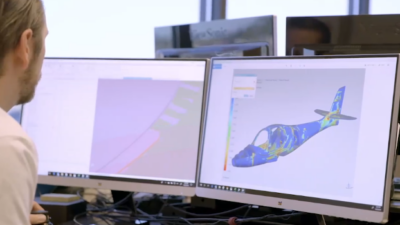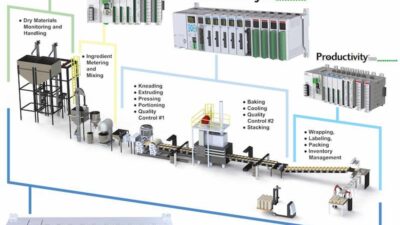The expansion of PLM into factory automation provides a major point of integration between the traditional arena of PLM and the production planning arena of enterprise resource planning (ERP). Indeed, factory automation and product structure definition are areas of heavy overlap.
Product Lifecycle Management (PLM) once focused almost exclusively on engineering design but now includes many other disciplines such as product planning, quality engineering, customer service and maintenance. One particular expansion of PLM strategies has been a push to become more closely integrated with factory automation systems such as MES (Manufacturing Execution Systems)and PLCs (Programmable Logic Controllers).
This migration of PLM onto the shop floor provides an opportunity to share and leverage product-related information from both environments, enabling manufacturing information to be incorporated earlier into product development, while knowledge of production-related issues flows more readily back into the product design process.
Major initiatives are underway to expand PLM with digital manufacturing for developing production processes and simulating factory-floor workflow. Similarly, PLM has long been involved with NC programming for individual machine tools. Integrating PLM and factory automation takes this whole evolution a step further to control of entire workcells on the shop floor.
The expansion of PLM into factory automation provides a major point of integration between the traditional arena of PLM and the production planning arena of enterprise resource planning (ERP). Indeed, factory automation and product structure definition are areas of heavy overlap between PLM and ERP. Integration provides the opportunity to share and leverage key product-related information from both environments, and it offers excellent opportunities to better integrate the entire manufacturing enterprise.
Serious moves forward
Both ERP and PLM suppliers have an opportunity to seriously move toward meeting this need. In fact, more emphasis on this area can be seen from major ERP suppliers with more substantive programs for ERP-MES integration. Clearly, there also will be a significant impact on suppliers of factory automation solutions as well as PLM suppliers.
The availability of more integrated PLM-factory automation capabilities should raise the competitive pressure on traditional suppliers of factory automation solutions and increase industry attention on such solutions. Movement of the PLM market toward greater integration with production systems will undoubtedly impact the competitive landscape for suppliers of broad-based comprehensive PLM solutions as well as suppliers of more limited-scope offerings.
Commercial availability of integrated PLM-factory automation solutions notwithstanding, companies must absolutely find ways to justify and fund these investments – especially in today’s economic slump. Organizations wanting to take advantage of the value offered by broad PLM solutions integrated with factory automation must raise the level of the investment discussions to include the full executive team—including managers on the VP level as well as CEOs, CIOs, and CTOs—and consider these investments as critical enterprise-wide initiatives. Integration with factory automation ensures manufacturing’s key role in PLM strategies, and significantly enhances the overall business value of these solutions as design, manufacturing, and information management are more fully integrated.
The expanding scope of an integrated PLM and factory automation vision and strategy requires re-thinking and solid effort to be effective. The potential business value is too significant to ignore, however, and forward-thinking companies will be leading this movement as PLM’s footprint takes a big step onto the factory floor.
Significant technical challenges and organizational barriers notwithstanding, early adopters that put in the time and effort into integrating PLM and factory automation have a tremendous opportunity to highly differentiate themselves on an otherwise level playing field and emerge as clear business winners in the coming years.
Ed Miller is president of CIMdata Inc. , an independent, global consulting firm specializing in PLM technologies and services.
Siemens bets ERP/PLM integration will continue apace


